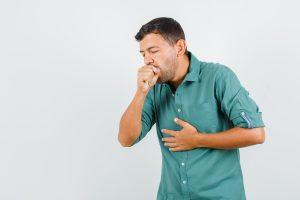Of course, there are many different reasons you might develop a cough; however, in some cases, it can be a sign of a heart problem.
Asthma vs. Cardiac cough
Cardiac asthma is coughing or wheezing with congestive left heart failure, hypertension, or high blood pressure. This wheezing could be a medical emergency, depending on the severity of the symptoms. Heart failure can cause excess fluid to build up in the lungs (pulmonary edema) and in and around the airways, causing lung congestion. The cardiac cough is your body’s attempt to clear out the fluid. This can cause shortness of breath, coughing, and wheezing, similar to the signs and symptoms of asthma.
On the other hand, regular coughing/asthma is a condition where inflammation causes the narrowing of the airways, leading to breathing difficulties. Thus, true asthma has nothing to do with lung fluid or heart disease.
Are the treatments different for asthma vs. cardiac cough?
Yes. While treatments for cardiac cough improve the symptoms of both heart failure and cardiac asthma, medicines such as inhalers that are only effective for true asthma when used in the case of cardiac cough could be harmful and potentially lead to a worsening of the heart condition.
The treatment for cardiac cough includes dietary supplements and controlled salt, sodium, and fluid intake. A mighty effective medication is a Diuretic with which you remove the extra fluid in the lungs. In severe cases, an implantable cardioverter defibrillator or pacemaker may be implanted.

How to recognize signs of cardiac cough:
If you have heart failure and are coughing or start coughing soon after a change in heart-failure medications or dosage adjustment, you need to pay attention to it. While the symptoms might vary depending on the root cause, an indicative list of symptoms that means you should visit your doctor:
- A wet cough that produces pink color mucus due to the blood.
- If you have heavy wheezing or experience a whistling sound that happens while breathing, accompanied by coughing.
- You quickly run out of breath even with mild physical activities, or when you lie down, you experience shortness of breath.
- A bubbling feeling in the chest.
- A non-treatable long-term dry cough.
- You have lung disease and develop a new or worsening cough.
So don’t self-treat a prolonged cough with over-the-counter cough medicine. Visit a doctor if you are experiencing any of these symptoms.






